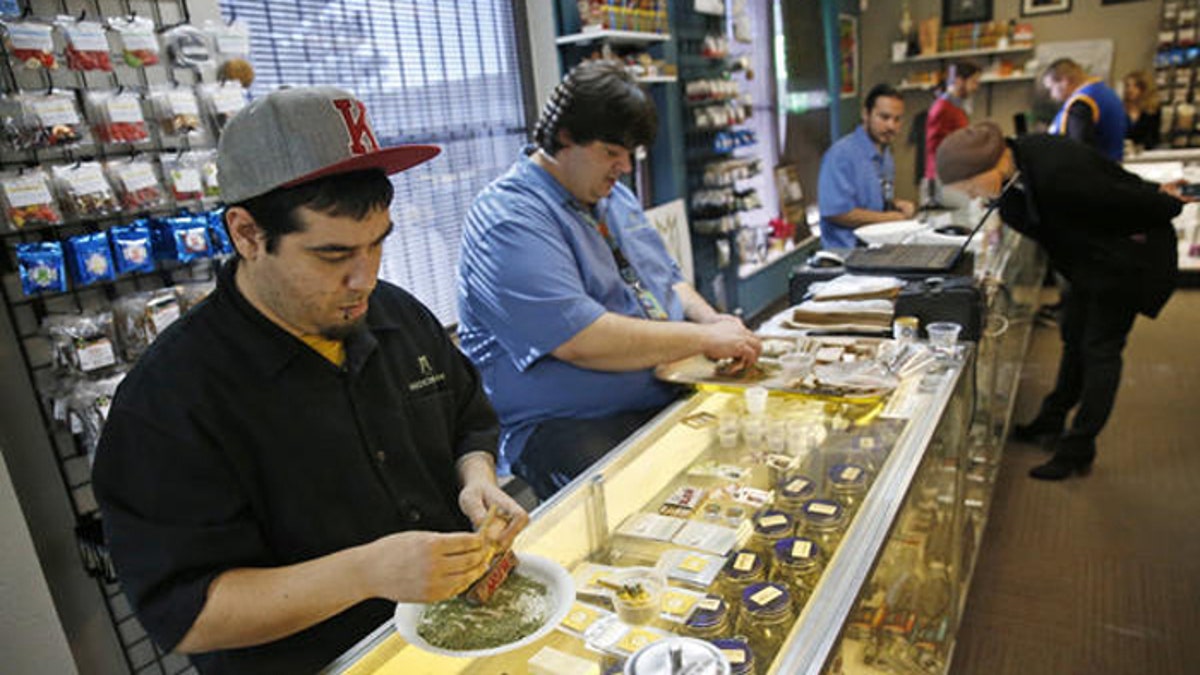
Employees roll joints behind the sales counter at Medicine Man marijuana dispensary in Denver. (AP)
As the smoke settles from the first week of legal marijuana sales in Colorado, experts are warning that sanctioned pot dealers could become targets for the very folks they put out of business.
Taking over a trade once ruled by drug cartels and turning it into an all-cash business could make pot shops prime targets for extortion, black-market competition and robbery. One veteran border narcotics agent told FoxNews.com Colorado's legal pot industry will find it hard to keep the criminals from horning in on a lucrative business they once controlled.
[pullquote]
"Mexico is already in Colorado without the risks," the agent, who requested anonymity, said of the state's heavy pre-existing cartel presence. "Legal businesses will likely see a rise in extortion attempts while law enforcement will see a lot of backdoor deals being made."
Cartels, especially the Juarez and Sinaloa, who have a strong presence in Colorado, could not have been happy with the estimated $1 million in sales Jan. 1, the first day of legalized retail sales. In 2012 the Mexican Competitiveness Institute issued a report saying that Mexico’s cartels would lose as much as $1.425 billion if Colorado legalized marijuana. The organization also predicted that drug trafficking revenues would fall 20 to 30 percent, and the Sinaloa cartel, which would be the most affected, would lose up to 50 percent.
Faced with such losses, the violent cartels could force their way in as black market wholesalers or simply rob pot dispensaries, which take only cash and have not been able to establish accounts with banks because of lenders' fears of violating federal laws. But the general consensus is that the Mexican cartels will not quietly relinquish the Denver market.
The owner of the Colorado Springs dispensary told the Denver Post he is planning to get a concealed-weapons permit, for protection when he has to move money out of the store.
"Any way you plan it out, there's going to be a large amount of cash around," he said. "And that's extremely scary."
Denver police are taking a wait-and-see posture as to what may emerge.
“It’s only been a week, so we still have to sit back and see how this will play out,” Denver Police spokesman Sonny Jackson told FoxNews.com. “We’re a police department, we’re always concerns about what may happen.”
Jackson said he would not speculate as to if or which cartels may decide to infiltrate the legitimate businesses or how.
“We’re concerned with the public consumption right now,” Jackson said.
The Marijuana Enforcement Division of the Colorado Department of Revenue, the primary enforcement office responsible for overseeing the production and sale of the retail marijuana, did not return repeated attempts by Fox News.com for comment.
Denver DEA office spokesman Albert Villasuso said with some 50 retail outlets in operation, the agency can only monitor if, how and when the cartels decide to move in to the legalized retail industry in Colorado.
"What is quite possible is that cartels will hire straw owners who have clean records who can apply for a license, then sell large quantities both legally and on the black market," Villasuso said. "We still don't know what the fall out will be but when there is this much money involved the potential is great for groups to want capitalize."
Villasuso also said that even if legal stores do face extortion efforts by cartel groups it is unlikely law enforcement will even be made aware of it if merchants are too frightened to come to police. Extortion has proven to be a lucrative ancillary enterprise for cartels in Mexico resulting in thousands of businesses closing rather than pay the quota, as it is called, or the store owners face the threat of death, which too has occurred.
One group who hopes to mitigate any risks is the Blue Line Protection Group, which specializes only in security for the marijuana stores.
Seeing a growing market, Ted Daniels started the company and uses ex-military and law enforcement to provide security for the stores' money and supply shipments, and the growing operations. The highly-trained and combat-experienced guards are heavily-armed with assault rifles and protective vests.
"This was an industry here that created a lot of challenges," Daniels told WDVR television news in Denver Jan. 7. "This group I put together is designed specifically to protect product, people, and money."









































